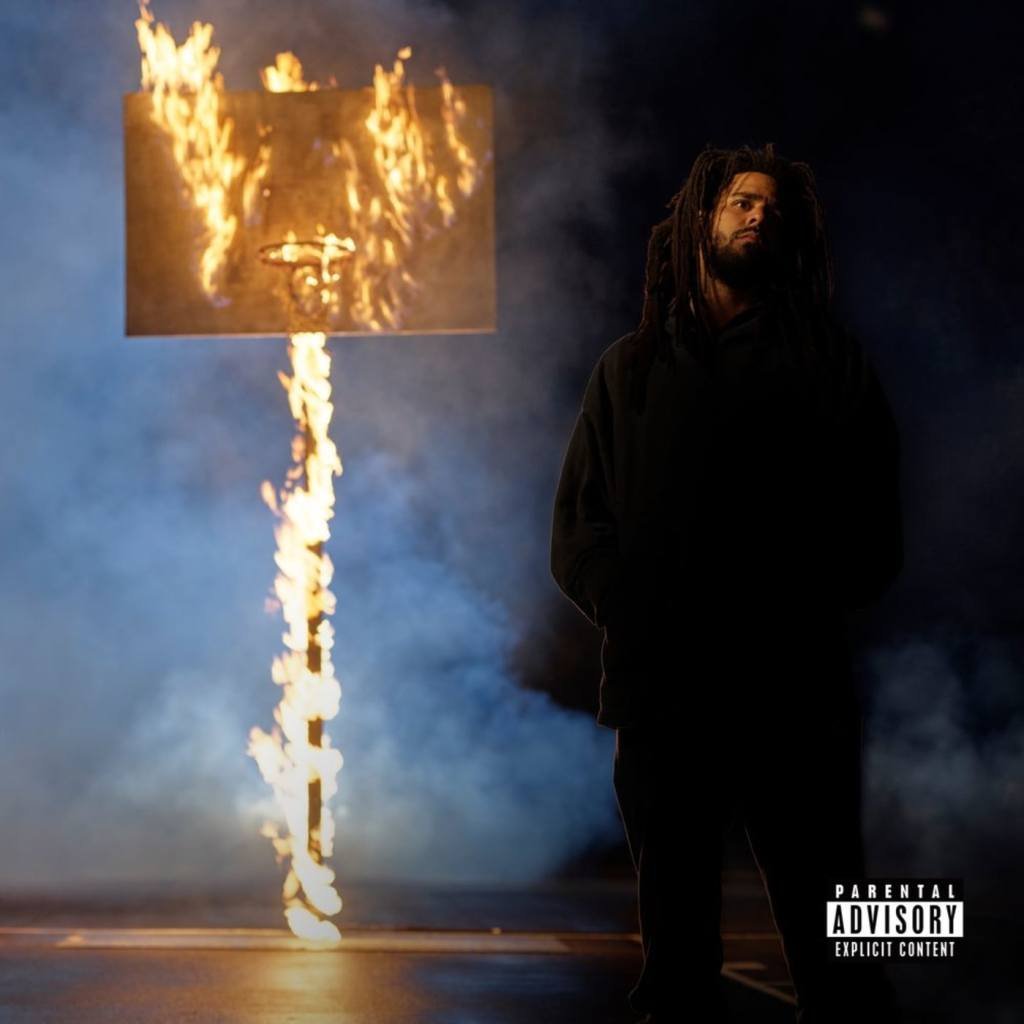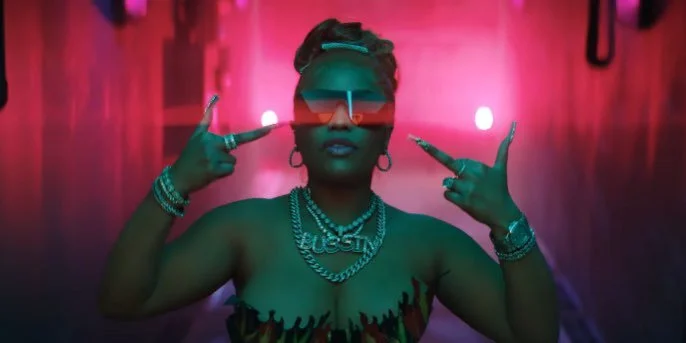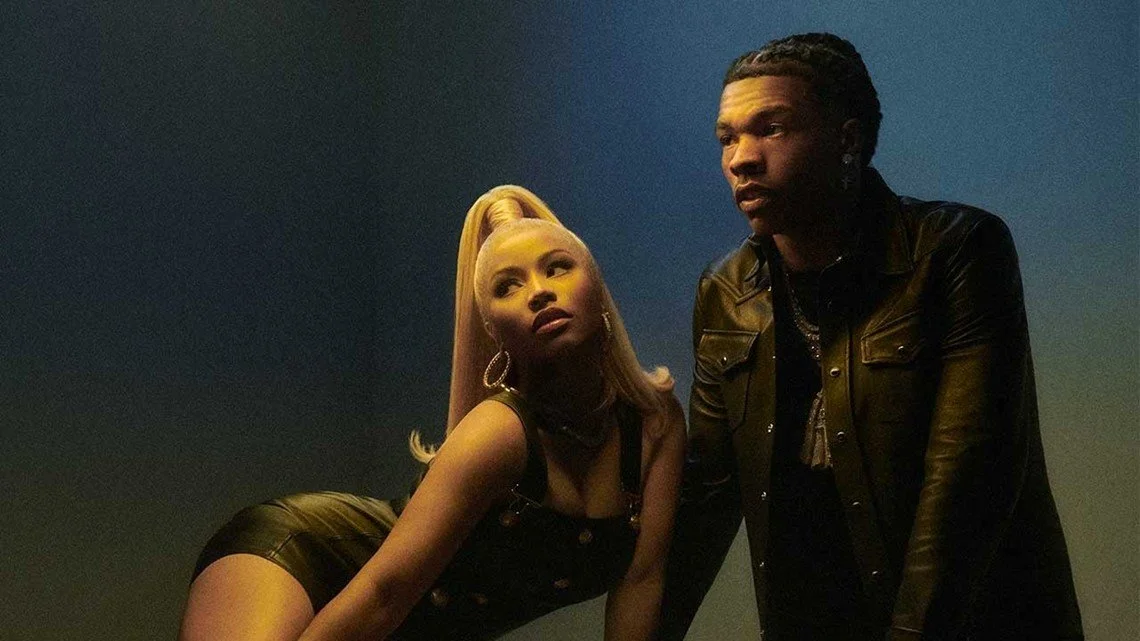Album Review: J. Cole Returns to Form With 'The Off-Season'
When J. Cole drops an album, the whole world listens. Things were no different when Cole finally put out The Off-Season, his highly anticipated sixth studio album. Cole and fellow hip-hop heavyweights Drake and Kendrick Lamar comprise a sort of Holy Trinity of 2010s rap. While Drake has emerged as the commercial juggernaut and Kendrick as the critical darling, Cole has carved out an interesting and strikingly singular lane of his own. He's proven that he can have the blockbuster albums (Born Sinner, 2014 Forest Hills Drive), the acclaim (he recently scored his first Grammy for his featured turn on 21 Savage's "a lot"), and the hit singles ("Work Out," "Power Trip," "Middle Child," etc.), but people love Cole and return to his work because of his commitment to intricate storytelling and narrative-driven raps. Having been preceded by a string of excellent guest verses ("The London," "a lot," etc.) and the culture-shifting moment that was Revenge of the Dreamers III, The Off-Season was held to high standards before a date was announced or an album cover revealed. Just days before the album's full release, Cole dropped a 12-minute documentary titled Applying Pressure. The short doc was essentially an extended teaser for The Off-Season; the documentary found Cole grappling with his legacy as the end of his run draws nearer while also chronicling his journey back to loving rap and continuing to challenge and top himself. A private and quiet celebrity outside of music-related ventures, we really only get to pick Cole's brain through his music. With all of this considered, The Off-Season didn't necessarily have a lot riding on it, but there was a lot of hype carrying it to its release date. Based on Applying Pressure and the lyrics of "i n t e r l u d e" (a track from The Off-Season that was released one week before the full album), Cole proclaimed himself to be in top form, if not the strongest he's ever been. In some ways, he is. In other ways, The Off-Season exposes why Cole is so acutely aware of the end of his run and why he is so concerned with bowing out gracefully.
On The Off-Season, J. Cole is at his best when he focuses on flexing his storytelling skills and bouncing off the energy of his chosen collaborators (Morray, Bas, 21 Savage, Lil Baby & 6LACK). The album starts to feel regressive when he gets hyper-aware of his status as a "middle child" and his future in the rap game. Opening with "9 5 . s o u t h," The Off-Season gets off to a pitch-perfect start. Anchored by production from Coleman, Maneesh, and Boi-1da, Cole spends the album's introductory track talking his shit, to put it plainly. After a brief, but important, spoken intro from Cam'ron, Cole raps "This shit too easy for me now/Nigga, Cole been goin' plat' since back when CDs was around/What you sold, I tripled that, I can't believe these fuckin' clowns." The sound of "9 5 . s o u t h" is militant and grand; it's a rowdy marriage between the grimiest of Southern rap and the most menacing notes of New York rap. Between the impassioned chants and the brooding horns, it's easily the most immediately arresting song on the album. In the Applying Pressure documentary, Cole illustrated the importance of Queens, New York, and Fayetteville, North Carolina in his story and his career. "9 5 . s o u t h" combines influences from up and down the East Cost (Atlanta's Lil Jon features on the addictive chants in the song's outro) to create one of the clearest standout tracks on the album. "9 5 . s o u t h," which borrows its title from literally driving southbound on I-95, is reminiscent of "G.O.M.D." with the physicality that the music evokes, but the majority of The Off-Season rests on more melodic flows that are marked by the influence of new generation rappers like Lil Baby.
Dreamville/Roc Nation/Interscope
With "a m a r i," Cole builds on the melodic slightly slurred and Auto-Tuned flow that helped make "MIDDLE CHILD" and his "The London" verse so singular. Named after the son of Dreamville label manager Ibrahim Hamad, "a m a r i" finds J. Cole immediately building off the horns that held "9 5 . s o u t h" together. He recreates the brassy sound with "ba-ba-ba" vocalizations before launching into a lengthy verse detailing his rise to hip-hop's highest heights. Produced by Timbaland, T-Minus, Sucuki, and Cole himself, this track gets most of its flavor from the guitar accents sprinkled throughout the instrumental. Without a doubt, Cole is rapping, but his cadence shifts to singing, so at some points, he's performing some convoluted version of vocal riffs like on the line "Out of the concrete was a rose and winters was cold." This all makes for a more interesting listen and adds to the variety of influences at play on The Off-Season. "1 0 0 . m i l'" and "i n t e r l u d e" are two more instances where Cole employs a more melodic flow. The former returns Cole to the soul sample-driven sound that he sounds most at home at. Here, Cole is putting on wax all that he ruminated on in the Applying Pressure documentary. He begins the track with a slick rhetorical question: "How come a nigga ain't enter his prime?/Still gettin' better after all this time." Cole's commitment to constantly topping himself and bettering his craft is admirable, and it works on a track like "1 0 0 . m i l'." Nevertheless, it does get taxing when an artist is telling us the primary theme of an album instead of simply showing it through how they handle different topics across a project. This is an issue that is especially apparent on "a p p l y i n g . p r e s s u r e"; Cole spends the track berating rappers who falsely flaunt wealth to compensate for a more humble reality. He may be "applying pressure" to those rappers, but it doesn't make for a song that's as compelling as the ones where he's telling stories about his past or sharing narratives that have had a genuine impact on his psyche and soul.
Cole finally taps into what made him so beloved on songs like "l e t . g o . m y . h a n d" and "c l o s e." On the former, Cole grapples with getting older, family, parenthood as the father of a Black child in America, and life beyond the confines of the rap game. Cole opts for a more stream-of-consciousness type flow as he meanders through relatively somber production courtesy of himself, Wu10, DJ Dahi, and Frank Dukes. It's one of the more tender and candid moments of the album where Cole takes a step away from flexing on his peers and worrying about the trajectory of his career. Instead, he recounts moments that bring him back down to Earth; "Today my son said, 'Dad, let go my hand'/Reminded me one day he's gonna be his own man." Also, the harmonies provided by Bas and 6LACK are some of the best musical moments on the entire album. Conversely, "c l o s e" makes for one of the more gruesome moments on The Off-Season. Here, Cole tells the story of a murder of a friend who fell to the perils of drugs and gang life. With tributes to Nas ("Ville-matic") and the late MF Doom (the song samples some of “Valerian Root"), "c l o s e" is where Cole really locks in and focuses on delivering those lyrically and emotionally dense stories that, in essence, are about life. When Cole isn't doing that, The Off-Season reaches its other peaks with "m y . l i f e" and "p r i d e . i s . t h e . d e v i l." The former, which features show-stealing appearances from Morray (a name you may recognize from the viral hit "Quicksand") and 21 Savage, finds Cole floating over an addictive instrumental that interpolates Styles P and Pharoahe Monch's "The Life" (2002). Cole delivers as expected, but Morray is the glue that holds the track together; he blesses the song with an impassioned John Legend-esque hook that drives home the message of perseverance in the face of the worst trials, tribulations, and struggles. 21 Savage also delivers a standout verse that builds on his now-trademark macabre style of rap. He also gives us one of the best lyrics of 2021 so far: "I got a good heart, so I send teddy bears every time we make they mommas cry." Upon release, the featured artists on The Off-Season were not credited in the titles as is customary across digital platforms. So, when "p r i d e . i s . t h e . d e v i l" began, and Lil Baby seamlessly slid in halfway through the track to deliver the best verse of the song, it was a moment for the books. One of the clear cut radio singles on The Off-Season, this song is about exactly what the title suggests. The two rappers don't do much to expand the metaphor of the title, but they don't have to because the production is hot and flows are hotter.
After inadvertently making featureless albums a cultural phenomenon with 2014 Forest Hills Drive, Cole reminds us, and himself, that collaboration is key. The choice to tap Morray, 21 Savage, and Lil Baby speaks to Cole settling into his role as one of the new class of hip-hop elders as the new generation continues their takeover. None of the three aforementioned artists edit their style to fit into the J. Cole/Dreamville mold; they each bring their own unique notes that make them interesting and force Cole to feed off of their energy and bring new life to the tracks that they are featured on. It should also be noted that Lil Baby has now outshined 2/3 of the 2010s Hip-Hop Holy Trinity on songs where he was the guest artist. The Off-Season is a solid effort from a rapper that has proven time and time again that he is in a different league. Whether or not Cole is actually in top form on this album is questionable. On the one hand, he's packing big punches sonically (this is some of the best production of his career), but on the other hand, the album's inconsistency seems to prove that he got in his own way a little bit. In more than one instance, the production carries the lyricism and performance on this album which isn't necessarily the worst thing in the world, but it feels off when it's happening to J. Cole. Regardless, this is undoubtedly a step-up from KOD and 4 Your Eyez Only, and if this is just the "off-season," there simply must be even greater things in store for what is rumored to be Cole's final album.
Key Tracks: "m y . l i f e" | "p r i d e . i s . t h e . d e v i l" | "9 5 . s o u t h" | "l e t . g o . m y . h a n d" | " c l o s e"
Score: 75






Nicki Minaj returns with her first solo offering of 2023.